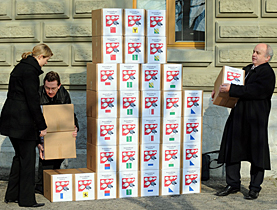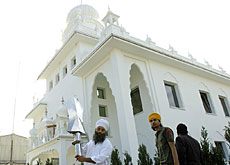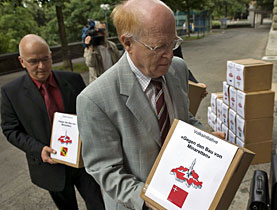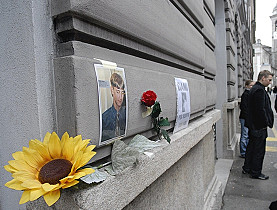Rightwing plans “violate human rights”

The rightwing Swiss People's Party has reignited a debate over human rights by calling for immigrants who commit crimes to be expelled, and a ban on minarets.
Opponents have already begun to fight the proposed measures, even though the government has not yet said when the two initiatives will be put to nationwide votes.
The cabinet has said it supports neither initiative, arguing that if accepted by the electorate, they would bring Switzerland into conflict with international law and constitutional guarantees.
Marc Spescha, a Zurich-based lawyer specialising in the rights of immigrants, is much harsher in his condemnation. He says both initiatives violate fundamental constitutional and human rights.
Speaking at a recent symposium in Bern organised by the Swiss branch of Amnesty International, Spescha said they breached in particular the European Human Rights Convention and United Nations pacts including the Refugee Convention.
“I would welcome a decision by parliament to declare the initiatives invalid, especially the one on the expulsion of foreigners,” Spescha told swissinfo.
If the first initiative is approved by the electorate, immigrants found guilty of crimes ranging from murder, rape and armed robbery to social security infractions would be expelled, and banned from re-entering the country for up to 15 years.
Islamophobia
Other experts at the meeting expressed concern that the fact the Swiss People’s Party was able to collect enough signatures to force a vote on this and the minaret issue was evidence of rising xeno – or Islamo – phobia.
The head of a research institute, who asked for his name and that of his organisation not to be mentioned in the media, said the general perception in the country was that Muslims are fanatical, discriminate against women and harbour terrorists.
He said this was why many Swiss preferred not to work or go to school with Arabs, Turks or Albanians.
Based on these remarks Daniel Bolomey, the secretary-general of Amnesty Switzerland said the vote to forbid the building of minarets, for example, could not be reduced to a debate on freedom of religion.
“We need to understand how people perceive these issues in their daily lives,” Bolomey told swissinfo. “It’s not about Muslims’ need for minarets or how high these should be – it’s a much broader question.
Basic human rights
“We need to tell voters that it’s a basic human rights issue.”
For historian Hans-Ulrich Jost, Switzerland’s multiculturalism retarded the development of a sense of nationalism and “hard-line” patriotism, which appeared much earlier in other countries.
Nationalism and patriotism, he said, arose as a product of Switzerland’s neutrality during the world wars.
“A negative side to this nationalism is the feeling the Swiss have of being a special case. ‘Others are not as good as the Swiss, or don’t work as well as the Swiss’, so we have created a kind of consciousness which is similar to the nationalism found in other countries,” Jost told swissinfo.
The head of the research institute shot down the argument made by another historian that the media was mostly to blame for giving immigrants a bad name by sensationalising issues involving foreigners.
He said studies had shown that Swiss voters are influenced more by their own daily encounters with Islam or Muslims.
Dilemma
This presents the Swiss with a dilemma, he added. On the one hand, they tend to support anti-foreigner initiatives even though they listen carefully to the counter arguments from opinion leaders.
But at the end of the day, voters base their decision on what they see as the long-term consequences for Switzerland, and not whether they sympathise with the initiative in question.
Bolomey called for the debate on human rights to begin in the classroom.
“It’s a long term issue. It’s a question of education and not something that can be done during a political campaign,” he said.
“We need to work with children at school to show how all communities can live together. When I talk about integration I don’t mean teaching people from Kosovo how to yodel.
“Switzerland should be a melting pot; people should be integrated along with their culture.”
In this scenario, Bolomey said, Muslims would continue to have the right to build minarets.
swissinfo, Dale Bechtel
In Switzerland, more than three quarters of the population are Christians – 42% are Catholic, 35% Protestant and 2.2% belong to other Christian denominations.
With more than 310,000 members (4.3%), Islam is the second-largest religion in the country. 12% of Muslims have a Swiss passport. They come mainly from the Balkans and Turkey.
The Jewish community has about 18,000 members (0.2%), of which 80% are Swiss.
There are 28,000 Hindus and 21,000 Buddhists.
The initiative was handed in to the government in July 2008 after more than the required 100,000 signatures were collected. The text is only one sentence long: “The building of minarets is forbidden.”
The government’s response, calling on the electorate to reject it, was much longer, running to 50 pages.
In essence, the cabinet argues that the prohibition of the spires, usually found outside mosques, would violate international human rights norms. It also said that a ban would hinder integration and would be ineffective in the fight against extremism.
The Swiss People’s Party handed in the initiative in March 2008.
According to the text, foreigners will lose their right to reside in the country if they are convicted of a serious crime such as pre-meditated murder, armed robbery or social security infractions. Once expelled, they would be banned from re-entering Switzerland for up to 15 years.
The government wants to see the proposal turned down by voters since it conflicts with international law and constitutional guarantees. However, the cabinet said it will draft a counter proposal which will address the concerns of the People’s Party in a legally conform way.

In compliance with the JTI standards
More: SWI swissinfo.ch certified by the Journalism Trust Initiative




You can find an overview of ongoing debates with our journalists here . Please join us!
If you want to start a conversation about a topic raised in this article or want to report factual errors, email us at english@swissinfo.ch.